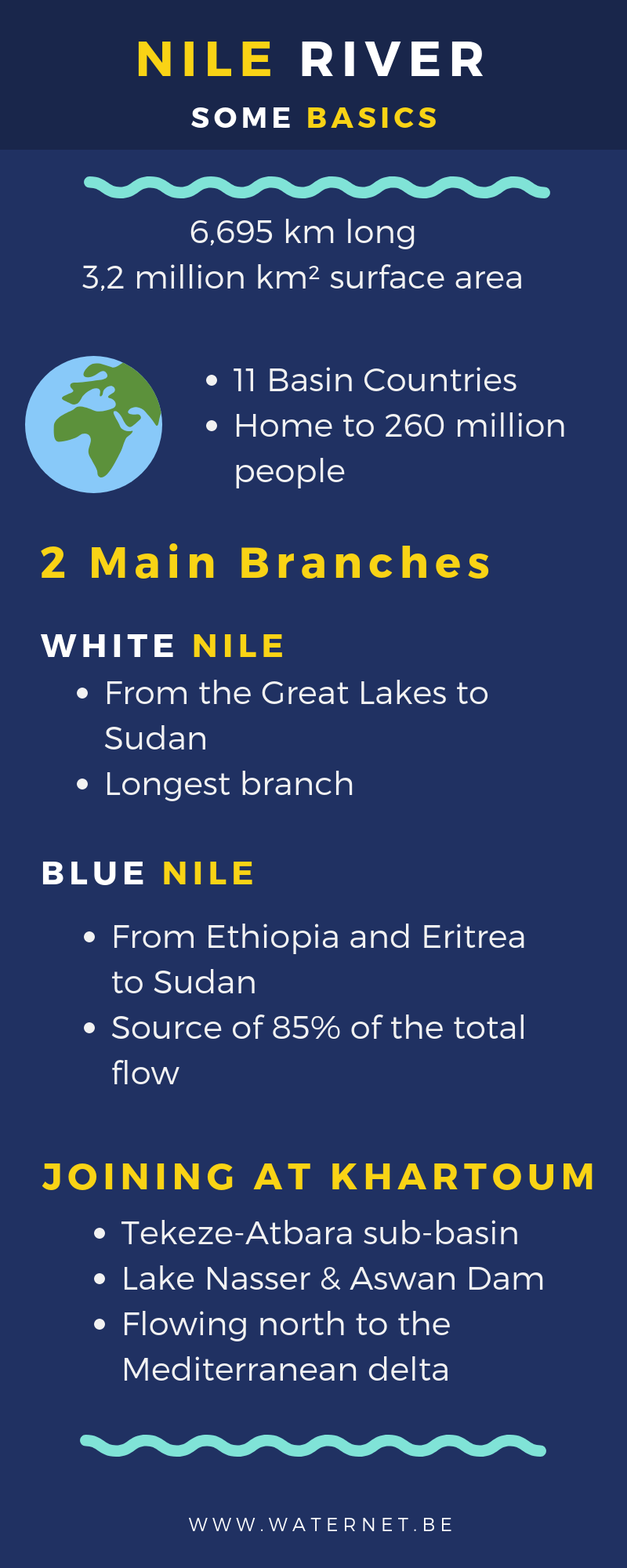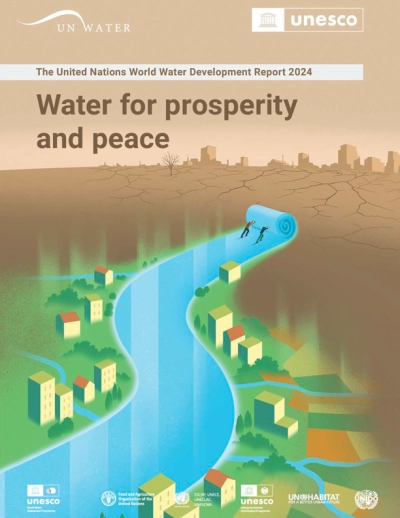Transboundary organisations and programs
- The Nile Basin Initiative (NBI) is an intergovernmental partnership of 10 Nile Basin countries, established in 1999.
The NBI Secretariat is based in Entebbe, Uganda. The Council of Ministers of Water Affairs of the Nile Basin Countries (Nile-COM) is the highest decision-making body of the NBI. In October 2017, Ethiopia took over Nile-COM leadership from Uganda. Current chair is Sileshi Bekele, Ethiopia’s Minister for Water, Irrigation and Electricity.
Every two years, a Nile Basin Development Forum is being organised. The 5th forum, dedicated to the theme "Investing in Nile Cooperation for a Water Secure Future", took place in October 2017 in Rwanda. - The Nile Basin Discourse (NBD) is a civil society network with over 850 members and partner organizations within the Nile Basin region. NBD offers a public platform for dialogue, partnership and cooperation among civil society organizations in the Nile Basin.
In November 2017, the NBD organised its first Summit on "Integration and inclusion: new ideas for collaboration in river basin management policies and practises". An interesting overview of the presentations is now online. - World Bank - Cooperation in International Waters in Africa (CIWA) is a program to assist riparian governments in Sub-Saharan Africa in unlocking the potential for sustainable, climate-resilient growth by addressing constraints to cooperative water resources management and development.
CIWA provides funding for the NBI through the Nile Cooperation for Results Project (NCORE).
It also supports the Nile Basin Discourse (NBD) with the Engaging Civil Society for Social and Climate Resilience in the Nile project.
Treaties
The legal framework for water management in the Nile River largely dates from colonial times. Great Britain then controlled the bulk of the river basin, after its geopolitical struggle with France (cf. the Fashoda Incident). Germany (Rwanda, Burundi and Tanzania) and Ethiopia were the main upstream riparians - Belgium replacing the German administration in Rwanda and Burundi after the First World War and Ethiopia being occupied later by Italy.
These old colonial treaties are technically still into force, affecting mainly bilateral relations between basin states. But especially the 1959 Agreement between Egypt and Sudan claims to have an influence over the river as a whole. This is a bilateral agreement between the two most downstream riparians, who divide amongst themselves all the water of the river, from its sources to its estuary, thereby denying the rights of access to the water for upstream riparians. In the absence of a basin-wide agreement over sharing the Nille water resources, the 1959 treaty soured the relationship between especially Egypt and Ethiopia until today (see also my aticle on "Security as a threat to development in the Nile River Basin" with some more background on the geopolitics of the Nile).
The only multilateral agreement on the Nile Basin is the Agreement on the Nile River Basin Cooperative Framework of 14 May 2010, an initiative of the Nile Basin Initiative. The text has been rejected by by Egypt and Sudan, and as long as the treaty has not entered into force the text can be renegotiated. These negotiations are currently in process.
This is an overview of agreements and treaties that regulate state relations over water in the Nile Basin:
- The Anglo-Italian Protocol, 1891. Art. III of the Protocol refers to Nile River water: the Italian government engages not to modify the flow of the Atbarah River.
- The Agreement between the Great Britain and Italy over the Use of the River Gash, 1901.
- Treaty between Great Britain and Ethiopia, and between Great Britain, Italy, and Ethiopia, relative to the frontiers between the Soudan, Ethiopia, and Eretria, 1902.
- The Agreement between Great Britain and the Independent State of the Congo, 1906.
- The Tripartite Treaty between Great Britain, France and Italy, 1906. It denies Ethiopia "absolute sovereignty" over its water resources.
- Exchange of Notes between Great Britain and Italy Respecting Concessions for a Barrage at Lake Tsana and a Railway Across Abyssinia From Eritrea To Italian Somaliland, 1925.
- Exchange of notes between Great Britain and Egypt, in regard to the use of the waters of the River Nile for irrigation purposes, 1929.
- Exchange of notes constituting an agreement between Great Britain and Ethiopia amending the description of the Kenya-Ethiopia boundary, 1949.
- Exchange of notes constituting an agreement between Great Britain and Egypt regarding the construction of the Owen Falls Dam in Uganda, 1949.
- Exchange of notes constituting an agreement between Great Britain and Egypt regarding the construction of the Owen Falls Dam in Uganda, 1953.
- Exchange of notes constituting an agreement between Great Britain (on behalf of Uganda) and Egypt regarding co-operation in meteorological and hydrological surveys in certain areas of the Nile Basin, 1950.
- Agreement (with Annexes) between Egypt and Sudan for the full utilization of the Nile waters, 1959.
- Exchange of letters constituting an agreement between Egypt and Uganda on the Owen Falls extension project, 1991.
- Framework for General Cooperation between Egypt and Ethiopia, 1993.
- Agreement on the Nile River Basin Cooperative Framework ("Entebbe Agreement"). Opened for signature on 14 May 2010 in Entebbe, Uganda (not in force).
- Agreement on Declaration of Principles between Egypt, Ethiopia and Sudan on the Grand Ethiopian Renaissance Dam Project (GERDP), 2015.
This overview is mainly based on "International Water Law Project", a website dedicated to document international water law, case law and institutions.


